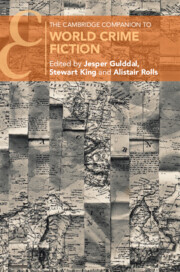Book contents
- The Cambridge Companion to World Crime Fiction
- The Cambridge Companion to World Crime Fiction
- Copyright page
- Contents
- Notes on Contributors
- Preface
- Chronology
- Chapter 1 What Is World Crime Fiction?
- Chapter 2 Crime Fiction and the International Publishing Industry
- Chapter 3 The Translation and Circulation of Crime Fiction
- Chapter 4 The International Crime Fiction Collection
- Chapter 5 Regional Crime Fiction
- Chapter 6 Women in World Crime Fiction
- Chapter 7 East Asian Crime Fiction
- Chapter 8 Crime Fiction in South Asia
- Chapter 9 Arab Crime Fiction
- Chapter 10 The Crime Fiction of Sub-Saharan Africa
- Chapter 11 European Crime Fiction
- Chapter 12 Scandinavian Crime Fiction
- Chapter 13 Iberian and Latin American Crime Fiction
- Chapter 14 World Crime Fiction in French
- Further Reading
- Index
- Cambridge Companions To …
Chapter 14 - World Crime Fiction in French
Published online by Cambridge University Press: 14 April 2022
- The Cambridge Companion to World Crime Fiction
- The Cambridge Companion to World Crime Fiction
- Copyright page
- Contents
- Notes on Contributors
- Preface
- Chronology
- Chapter 1 What Is World Crime Fiction?
- Chapter 2 Crime Fiction and the International Publishing Industry
- Chapter 3 The Translation and Circulation of Crime Fiction
- Chapter 4 The International Crime Fiction Collection
- Chapter 5 Regional Crime Fiction
- Chapter 6 Women in World Crime Fiction
- Chapter 7 East Asian Crime Fiction
- Chapter 8 Crime Fiction in South Asia
- Chapter 9 Arab Crime Fiction
- Chapter 10 The Crime Fiction of Sub-Saharan Africa
- Chapter 11 European Crime Fiction
- Chapter 12 Scandinavian Crime Fiction
- Chapter 13 Iberian and Latin American Crime Fiction
- Chapter 14 World Crime Fiction in French
- Further Reading
- Index
- Cambridge Companions To …
Summary
This chapter engages with the tensions between periphery and centre that are displayed by all forms of world crime fiction but that are especially telling in crime fiction in French. The notion of ‘French crime fiction’ is analysed, including the tensions inherent in Frenchness itself (the Francophone debate) and those between literature and genre fiction. Case studies include the nouveau roman, especially Michel Butor’s Passing Time, which stages the rules of crime fiction while simultaneously mapping them overseas; the nexus formed by Albert Camus’ The Outsider and Kamal Daoud’s The Meursault Investigation; the territorial and literary double spaces of Didier Daeninckx’s Murder in Memoriam; and questions of decapitation in Georges Simenon’s Maigret and the Headless Corpse and Marguerite Duras’s L’Amante anglaise. Additionally, the relationship between France, the Caribbean and Québec is traced in the genre-bending works of Maryse Condé, Patrick Chamoiseau, Fred Vargas and Anne Hébert. Through these texts, their points of intersection and their generic and geographical movements, crime fiction in French will be shown to exemplify the mobilities of world crime fiction.
Keywords
- Type
- Chapter
- Information
- The Cambridge Companion to World Crime Fiction , pp. 260 - 280Publisher: Cambridge University PressPrint publication year: 2022



